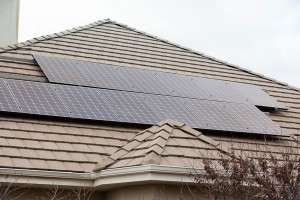Perhaps you want to save money on your electricity bill. Perhaps you advocate the environmental benefits of alternative energy. Whatever your motivation, if you’re thinking about installing solar panels at home, you’re likely thinking about one other factor: cost.
The good news is that you have options for how to go about making your solar dreams come true. The pathways between you and an energy-producing rooftop include: one-time purchase, solar lease, solar loan, and solar power purchase agreement. The financial avenue you choose depends on your goals, what fits in your budget, and your motivation for switching to solar energy. Those primarily interested in long-term savings on energy bills, for example, may prefer to take out solar loans or buy panels outright. For the environmentally-minded, leasing panels may prove more appealing.
For residential systems, solar panels themselves cost between $4,000 and $16,000. The price, calculated per watt, depends on roof size. “Residential solar systems,” according to Energyinformative.org, “are typically sized from 3 to 8 kilowatts and end up costing between $15,000 and $40,000.” The total cost incorporates not only the panels, but also installation and operational costs. Like buying a home, purchasing solar panels means buying financial responsibility. Though warranties may cover damages or malfunctions for a limited time, the cost of repairs or replacements post-warranty rests on the owner. Solar panel owners do, however, reap the greatest long-term financial benefits of this investment. Since they own the equipment, they directly benefit from the power produced by the panels, and can avoid or reduce electrical bills to an outside company. In some cases, solar panels generate excess power that electrical companies may buy from the homeowner.
Solar Loan
Banks, various companies, and even some municipalities offer loans for those who cannot afford to purchase solar panels all at once, but who wish to become solar panel owners and reap the long-term benefits. The fact that solar panels work to reduce electricity bills distinguishes between solar loans and other home improvement loans: “a solar panel loan allows you to own an asset that generates significant financial value … both the value of electricity generated … and the 30% federal investment tax credit and other applicable rebates and incentives” (http://www.energysage.com).
Solar Lease
Like leasing a car, leasing solar panels means that the solar company owns the panels. Leasers pay a fixed cost to use the solar panels and the power generated. In addition to being a little easier on the wallet – in the short term, at least – leasing solar panels can be easier on the mind. Because the solar company owns the system, the company takes responsibility for the cost and physical labor of any repairs or replacements. Along with the responsibility, however, the solar company, rather than the homeowner, benefits from any tax breaks or other financial incentives. And though leasing means fewer dollars up front, it also leaves homeowners with essentially no long-term financial benefit.
Though very similar to a solar lease, a few points differentiate a solar power purchase agreement (PPA). The solar company not only owns the panels, but also the power produced. In this situation, the homeowner essentially provides roof space to a solar company, who installs panels at no charge to the homeowner. In exchange for the installation, the homeowner agrees to purchase the power generated by the panels from the solar company instead of, or in addition to, a third party energy company. Based on current and predicted electricity prices, solar power offers participants an opportunity to spend less on power than they may with standard energy options. Though lacking a long-term financial benefit guarantee, PPA offers an investment-free avenue to a solar powered household.
For both environmental and financial reasons, before making a decision about solar power, consider assessing your household’s energy needs and eliminating unnecessary consumption. Even simple gestures like switching off lights in empty rooms can help! Likewise, a professional energy audit can help identify home improvement efforts – such as installing double-pane windows, improving insulation, and stopping drafts – that can also reduce energy consumption and consequential financial burden. You may find these simple steps a better financial and ecological solution than switching to solar.
For more in-depth information, check out energysage.com and energyinformative.org. These websites offer a wealth of information, including financial comparisons. You can also visit dsireusa.org, a national database for financial incentives for solar installation, and resnet.us, which offers a directory for finding energy auditors.
Posted in: Community
Comment Policy: All viewpoints are welcome, but comments should remain relevant. Personal attacks, profanity, and aggressive behavior are not allowed. No spam, advertising, or promoting of products/services. Please, only use your real name and limit the amount of links submitted in your comment.
You Might Also Like...

Two North State Organizations Focus On Healthy Eyes, Clear Vision
Watching a sunset, seeing the faces of children and loved ones, or the simple view of flower-filled grassy knolls are all pleasures in life that some people risk losing […]
Under the Flags of Gratitude: Sherwood Montessori fosters thankfulness with a Festival of Gratitude
Sherwood Montessori is kicking off November with an autumn festival on November 3. From after school to sundown, students and their families will play carnival games, run relays, enjoy a […]
Austin McCoy Takes His Love of Trains to Town – Meet Paradise Depot Museum’s Youngest Docent
Austin McCoy first fell in love with trains when he was 2 years old. He was in his car seat and his mom had come up to a railroad crossing, […]
Growing Up at ScienceWorks – Interactive Museum Offers Play, Education And Life Experience
High school-age intern leaders at ScienceWorks Museum in Ashland, Oregon swap stories and play foosball in the break room between shifts. Some have been coming here for more than 10 […]






